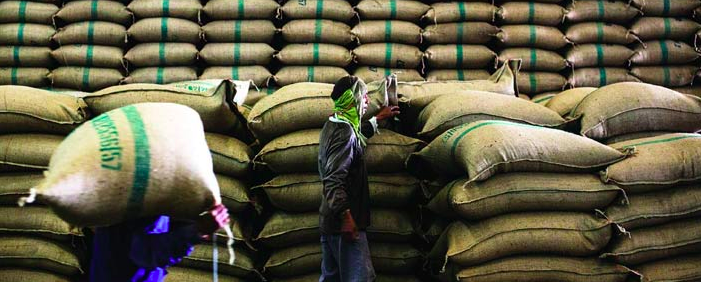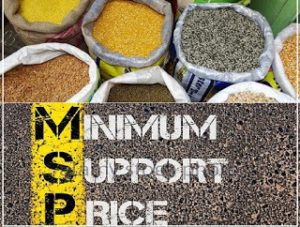
Minimum Support Price (MSP) is the price fixed by the Government of India for some of the listed agricultural crops in the market. It is a kind of market intervention to insure the farmers against any sharp fall in crop prices during bumper crop production. Minimum Support Prices are announced by the Cabinet Committee of Economic Affairs, Government of India at the beginning of the sowing season (Rabi and Kharif) for certain crops on the basis of the recommendations of the Commission for Agricultural Costs and Prices (CACP). Minimum Support Prices act as guaranteed prices for the farmer’s produce along with their long-term investment decision in the actual market.
The main aim of this market intervention i.e MSP, is to support the farmers from distress sales and to procure food grains for public distribution. Whenever, the market price for the commodity falls below the announced Minimum Support Price due to bumper production, thereby making a glut in the market, the government agencies such as FCI and Nafed, purchase the whole lot from the farmers at the announced minimum support price.
Determination of MSP
In formulating the recommendations in respect of the level of minimum support prices and other non-price measures, the Commission takes into account, apart from a comprehensive view of the entire structure of the economy of a particular commodity or group of commodities, the following factors:
- Cost of production
- Changes in input prices
- Input-output price parity
- Trends in market prices
- Demand and supply
- Inter-crop price parity
- Effect on industrial cost structure
- Effect on cost of living
- Effect on general price level
- International price situation
- Parity between prices paid and prices received by the farmers
- Effect on issue prices and implications for subsidy
The Commission makes use of both micro-level data and aggregates at the level of district, state and the country. The information/data used by the Commission, inter-alia include the following:
- Cost of cultivation per hectare and structure of costs in various regions of the country and changes there in;
- Cost of production per quintal in various regions of the country and changes therein;
- Prices of various inputs and changes therein;
- Market prices of products and changes therein;
- Prices of commodities sold by the farmers and of those purchased by them and changes therein;
- Supply related information – area, yield and production, imports, exports and domestic availability and stocks with the Government/public agencies or industry;
- Demand related information – total and per capita consumption, trends and capacity of the processing industry;
- Prices in the international market and changes therein, demand and supply situation in the world market;
- Prices of the derivatives of the farm products such as sugar, jaggery, jute goods, edible/non-edible oils and cotton yarn and changes therein;
- Cost of processing of agricultural products and changes therein;
- Cost of marketing – storage, transportation, processing, marketing services, taxes/fees and margins retained by market functionaries; and
- Macro-economic variables such as general level of prices, consumer price indices and those reflecting monetary and fiscal factors.
As already mentioned, 25 agricultural commodities are currently covered under the mandate given to the CACP for advising the government in respect of the price policy. The Commission is required to convey its recommendations to the Government well before the sowing season of the crop. With a view to interacting with various interest groups, the Commission follows the sequence of steps indicated below:
- The Commission identifies the main issues of relevance for the ensuing season (short, medium or long turn).
- The Commission sends a questionnaire to Central Ministries, State Governments and other organizations related to trade, industry, processors, and farmers both in the cooperative and the private sector and seeks their views on certain issues and factual information on related variables.
- Subsequent to step (ii), the Commission holds separate discussions with the State Governments, Central Ministries/Departments and other organizations. The Commission also interacts with research and academic institutions and keeps track of relevant studies and their findings.
- The Commission visits certain areas for on-the-spot observations and feedback from local level organizations and farmers.
Source: Click here farmer.gov.in
Crops Covered under MSP currently
- Cereals (7) – paddy, wheat, barley, jowar, bajra, maize and ragi
- Pulses (5) – gram, arhar/tur, moong, urad and lentil
- Oilseeds (8) – groundnut, rapeseed/mustard, toria, soyabean, sunflower seed, sesamum, safflower seed and nigerseed
- Copra
- De-husked coconut
- Raw cotton
- Raw jute
- Sugarcane (Fair and remunerative price)
For MSP of Rabi Crops of 2017-18 Season to be marketed in 2018-19: Click here

Nice one Apoorva..